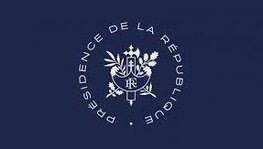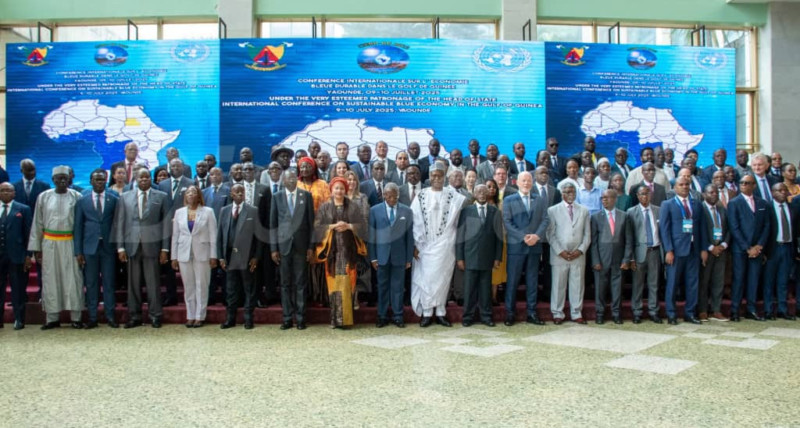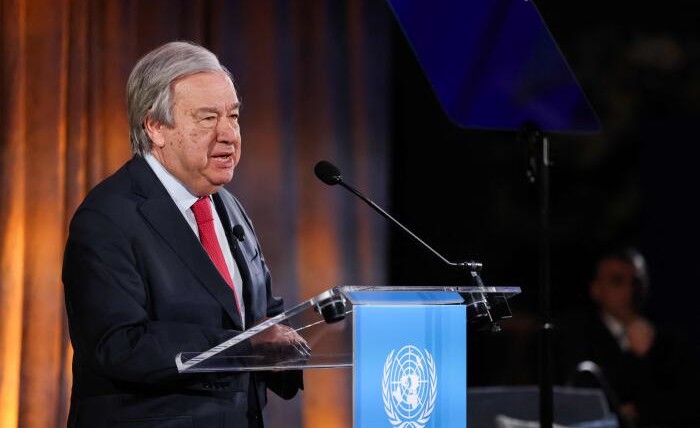From Nice to Belém: France and Brazil United to Act for the Ocean and Climate
Gathered in Rio de Janeiro on November 19, 2024, Presidents Luiz Inácio Lula da Silva and Emmanuel Macron committed to making the protection of the Ocean, marine and coastal ecosystems a strategic priority in their efforts to protect biodiversity and combat climate change, both bilaterally and multilaterally. Aware that the Ocean’s role in international agendas does not reflect its importance in climate and environmental balances, nor the threats to marine life, France and Brazil agreed to place the Ocean at the heart of the international diplomatic agenda.
Brazil and France, neighboring countries both on land and at sea due to French Guiana, are two oceanic and maritime nations. They share a particular responsibility for the protection of the Ocean and the sustainable management of resources.
Brazil will host COP 30 in November 2025, marking 33 years since the adoption of the UNFCCC and 10 years since the adoption of the Paris Agreement. In 2025, all Parties will need to present new climate goals through their nationally determined contributions. These goals must demonstrate the highest level of ambition, cover all sectors of their economies to mitigate greenhouse gas emissions, and align with the goal of limiting the average global temperature rise to 1.5°C compared to pre-industrial levels, in line with the recommendations from the first Global Stocktake of COP 28. Brazil and France reaffirm their commitment to contributing to the global enhancement of climate ambition and emphasize the importance of effective multilateralism to keep the 1.5°C target within reach, continuing the « Brazil-France Climate Ambition Call from Paris to Belém and Beyond, » launched by the two Presidents on March 26, 2024, in Belém.
France, along with Costa Rica, will host the next United Nations Ocean Conference (UNOC) in June 2025 in Nice. Facing the urgency of the Ocean’s condition, the UNOC will be an action-oriented summit based on concrete commitments and a consolidated roadmap for Ocean protection. The conference will result in the adoption of the Nice Action Plan for the Ocean, which must be as ambitious as possible to preserve the health and integrity of the Ocean.
To achieve Sustainable Development Goal 14 (SDG) and implement the 2030 Agenda, France and Brazil, as strategic partners, commit to launching a global initiative for the Ocean and climate within the G20, in preparation for the third United Nations Ocean Conference in June 2025 and COP30 in Belém. Our goal is to develop a fair and sustainable blue economy based on the Ocean, enhancing the resilience of marine and coastal communities.
Protecting Marine Biodiversity and Life in the Ocean
- France and Brazil reaffirm their commitment to implementing the Kunming-Montreal Global Biodiversity Framework, adopted by COP15 of the Convention on Biological Diversity (CBD), to ensure that by 2030, at least 30% of terrestrial and inland waters, as well as coastal and marine areas, are effectively conserved and managed through the establishment of ecologically representative, well-connected, and equitably managed protected areas, along with other effective area-based conservation measures. France and Brazil emphasize the importance of restoring degraded marine ecosystems. Both countries commit to strengthening the ecological connectivity and representativity of their marine protected areas.
- France and Brazil renew their commitment to contribute, under Article 20 of the Convention on Biological Diversity, to achieving the global financing targets for implementing the Kunming-Montreal Global Biodiversity Framework, adopted by COP15 of the CBD, by mobilizing all sources of financing, including domestic and international, public and private resources, while recognizing the specific challenges faced by developing countries.
- France and Brazil stress the importance of marine spatial planning and integrated coastal zone management. They particularly emphasize the need for each state to sustainably manage its exclusive economic zone (EEZ), balancing economic activities with the necessary environmental protection, and promoting the fair distribution of benefits derived from ecosystem services. As part of the UNOC, France is leading the « 100% Alliance » campaign, aiming to have a hundred countries commit to the initiative by June 2025 in Nice.
- In the context of marine spatial planning for the European Union’s overseas regions (MSP-OR), Brazil and France will continue exchanging information and best practices to ensure that each country’s plans are integrated in a way that meets the needs of the marine environment and its ecosystems and contributes to achieving ecological, economic, and social goals on both sides of the border.
- Brazil and France commit to maintaining updated and aligned national maritime policies, among other aspects, on the protection of marine biodiversity and marine life, and encourage other coastal countries to do the same. They commit to strengthening bilateral cooperation for the conservation and sustainable use of the Ocean, in line with their multilateral commitments, particularly those under the United Nations Convention on the Law of the Sea (UNCLOS), the 2030 Agenda, and the Sustainable Development Goals (SDGs), especially SDG 14.
- Aware of the importance of preserving the health and integrity of the ocean, particularly in areas beyond national jurisdictions, France and Brazil support the swift entry into force and implementation of the agreement related to the United Nations Convention on the Law of the Sea regarding the conservation and sustainable use of marine biodiversity in areas beyond national jurisdiction (BBNJ). They encourage the international community to contribute to this goal, taking advantage of the UNOC 3 in Nice in June 2025.
- France strongly and resolutely supports the creation of a whale sanctuary in the South Atlantic, a key breeding area for cetacean species, within the framework of the International Whaling Commission (IWC), a proposal championed by Brazil since 2001.
- The seabed harbors rich biodiversity and complex ecosystems with very fragile balance. The exploitation of the seabed may have environmental impacts that are not yet fully understood and could be significant or even irreversible. Convinced that no extraction activity should be allowed in the International Seabed Area without a robust regulatory framework that adequately protects the environment, France and Brazil advocate for the adoption of a precautionary pause on the exploitation of resources in the International Seabed Area. They will support the enhancement of scientific knowledge about the seabed and its ecosystems and the strengthening of international cooperation in this field.
- Recognizing that fishing exerts considerable pressure on fish stocks and, more broadly, on related marine ecosystems, sustainable management of fisheries, based on the best available scientific data, the precautionary principle, and an ecosystem-based approach, is at the heart of our individual and collective efforts to protect the Ocean. France and Brazil commit to preventing and combating illegal, unreported, and unregulated (IUU) fishing and will advocate for this approach in relevant international organizations to foster an agreement more favorable to the protection and regeneration of fish stocks. To prevent and combat IUU fishing, France and Brazil will strengthen their cooperation and information exchange bilaterally and within the regional framework of the Guiana Plateau.
Strengthening Climate Action in the Ocean Domain
- Determined to protect the ocean from the impacts of climate change and preserve marine ecosystems, including those acting as climate regulators and carbon sinks, France and Brazil recognize the importance of integrating ocean-focused actions into the preparation and implementation of their national policies on climate and biodiversity, such as Nationally Determined Contributions (NDCs), National Adaptation Plans (NAPs), and National Biodiversity Strategies and Action Plans (NBSAPs), particularly for ocean observation and coastal adaptation measures; and encourage all countries to do the same.
- France and Brazil will encourage the cities, regions, and coastal states most threatened by sea level rise in both countries to contribute to the exchange of best practices and solutions. They applaud the efforts of the « Ocean Rise and Coastal Resilience » Coalition.
- Brazil and France will support academic initiatives that foster the development of international law and the law of the sea, supporting studies and discussions on the challenges posed by sea level rise, to help address the complex legal questions arising in this new reality.
- To keep the 1.5°C target of the Paris Agreement within reach, France and Brazil will accelerate their efforts to operationalize the decision of the Global Stocktake to implement a just, orderly, and equitable transition, with a gradual phase-out of fossil fuels. France and Brazil are committed to promoting the use of renewable fuels in the commercial maritime transport sector to accelerate the sector’s energy transition and to meet the targets set by the IMO Strategy on Reducing GHG Emissions from Ships (2023) by adopting implementation measures as outlined in the strategy.
Improving Our Scientific Knowledge of the Ocean to Prepare for the Impacts of Climate Change
- France and Brazil benefit from a historic scientific cooperation in oceanography, marine technologies, and marine biodiversity. This partnership strengthens their efforts in ocean protection and the sustainable use of its resources.
- Aware of the links between terrestrial and marine ecosystems, Brazil and France will continue to deepen scientific knowledge and strengthen cooperation on the interconnections between the ocean, biodiversity, and climate, to protect populations and ecosystems from the impacts of sargassum proliferation, ocean acidification, and plastic pollution in line with the objectives of the United Nations Decade of Ocean Science for Sustainable Development (2021-2030).
- France and Brazil are committed to strengthening the interface between science and public policy and will explore the best ways to promote a comprehensive vision of ocean knowledge, particularly within the framework of the Intergovernmental Oceanographic Commission (IOC-UNESCO).
- Brazil and France welcome the recommendations from the « Ocean Dialogues » conferences held as part of « Oceans 20 » in 2024 in Rio, to which French and Brazilian research institutes contributed.
- Brazil and France are committed to continuing to invest in ocean scientific research, including by strengthening their existing centers of excellence and bilateral partnerships, and will identify new joint initiatives.
- Brazil and France welcome the ongoing exchanges to strengthen cooperation between the National Institute for Ocean Research (INPO) and Mercator Ocean.
- Brazil and France will jointly support the strengthening of cooperation on ocean issues, opening spaces for discussions on common themes during UNOC-3, to be held in Nice in 2025, and later at COP30 in Belém, also in 2025
Source: br.ambafrance




